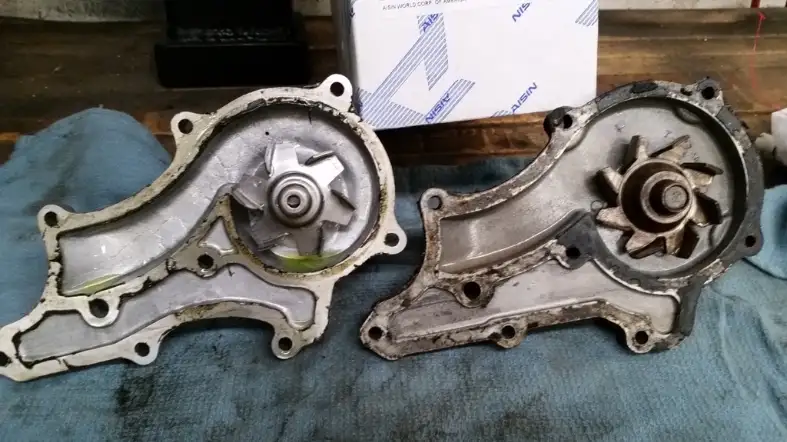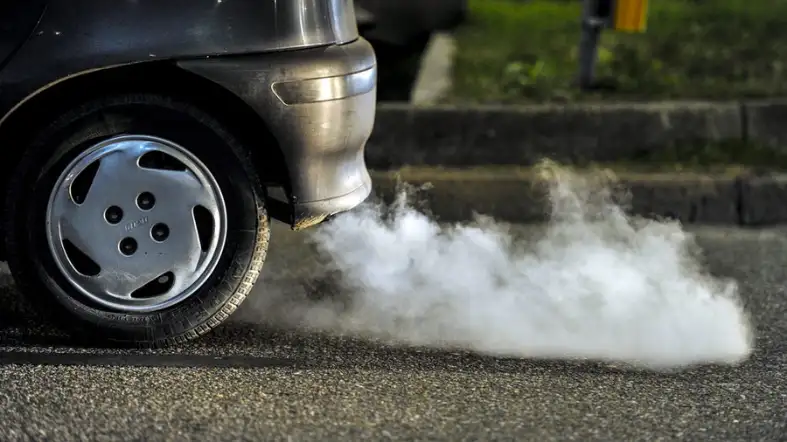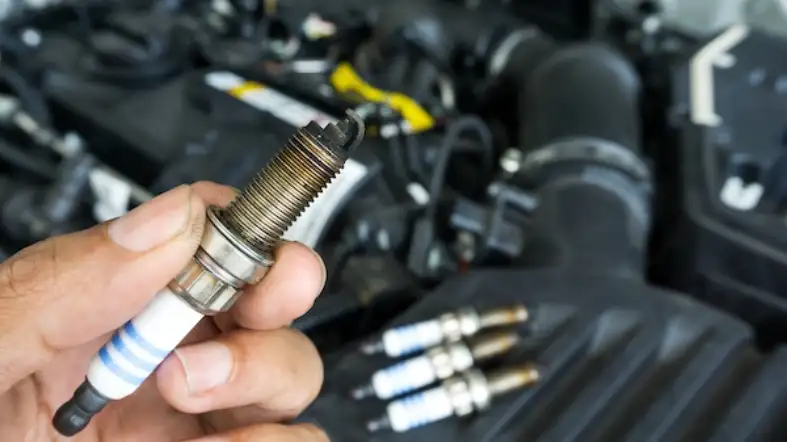Are you experiencing engine trouble and suspecting a bad water pump or blown head gasket?
These are common culprits when it comes to engine overheating and failure. But how can you tell which one is the root cause?
In this article, I’ll break down the differences between a bad water pump and a blown head gasket, their symptoms, and how to fix them.
Bad Water Pump Or Blown Head Gasket
The bad water pump can cause engine overheating, coolant leaks, and unusual noise. While a blown head gasket can cause engine misfires, overheating, and coolant mixing with engine oil.

Overheating is a common sign for both and white smoke from exhaust tells the problem of a blown head gasket.
How To Diagnose A Bad Water Pump Or Blown Head Gasket?
The water pump and head gasket can fail due to different reasons. A bad water pump can fail due to worn bearings, broken impellers, or leaking seals.
These issues can be caused by age, high mileage, or lack of maintenance.
On the other hand, a blown head gasket can fail due to overheating, a manufacturing defect, or improper installation.
Overheating can cause the cylinder head and engine block to expand at different rates, leading to the head gasket failing.
However, there are some distinct symptoms of each issue, which can help you determine the root cause.
Coolant loss
Both a bad water pump and a blown head gasket can cause coolant loss.
A bad water pump can cause leaks in the coolant system, while a blown head gasket can allow coolant to mix with the engine oil or escape through the exhaust.
Coolant loss can lead to engine overheating and damage.
Verdict:
Regularly checking your coolant levels can help you identify any potential issues early.
If you notice coolant loss, it’s crucial to have the issue diagnosed and repaired promptly.
Engine overheating
Both a bad water pump and a blown head gasket can cause engine overheating.
A bad water pump can cause a lack of coolant flow, while a blown head gasket can allow combustion gases to enter the coolant system, leading to overheating.
Engine overheating can cause severe engine damage and should be addressed promptly.
Verdict:
If your engine is overheating, it’s important to address the issue promptly to prevent further damage.
Steam or smoke from the exhaust

A blown head gasket can cause steam or smoke to come out of the exhaust due to coolant entering the combustion chamber.
A bad water pump is unlikely to cause smoke or steam. Smoke or steam coming from the exhaust can indicate severe engine damage.
Verdict:
If you notice smoke or steam coming out of the exhaust, it’s likely a blown head gasket and should be addressed immediately.
Continuing to drive the vehicle can cause further engine damage.
Coolant in the oil
A blown head gasket can cause coolant to mix with the engine oil, resulting in a milky appearance.
A bad water pump is unlikely to cause coolant to mix with the engine oil.
Coolant mixing with engine oil can cause engine damage and reduce lubrication.
Verdict:
If you notice a milky appearance in your engine oil, it’s likely a blown head gasket and should be addressed immediately.
Continuing to drive the vehicle can cause further engine damage.
Low oil pressure
A blown head gasket can cause low oil pressure due to the coolant mixing with the oil and reducing its lubricating properties.
A bad water pump is unlikely to cause low oil pressure.
Low oil pressure can cause severe engine damage and should be addressed promptly.
Verdict:
If you notice low oil pressure, have the issue diagnosed and repaired immediately.
Engine misfires

A blown head gasket can cause engine misfires due to coolant entering the combustion chamber and affecting the spark plugs.
A bad water pump is unlikely to cause engine misfires.
Engine misfires can cause further engine damage and should be addressed promptly.
Verdict:
If you notice engine misfires, have the issue diagnosed and repaired immediately to prevent further engine damage.
Noisy water pump
A bad water pump can cause a whining or grinding noise due to worn bearings or broken impellers.
A blown head gasket is unlikely to cause a noisy water pump.
A noisy water pump can indicate a failing water pump and should be addressed promptly.
Verdict:
If you hear a whining or grinding noise from your engine, have the issue diagnosed and repaired immediately to prevent further damage.
Loss of power
A blown head gasket can cause a loss of power due to reduced engine compression.
A bad water pump is unlikely to cause a loss of power. A loss of power can indicate a severe engine issue and should be addressed promptly.
Verdict:
If you notice a loss of power, have the issue diagnosed and repaired immediately to prevent further engine damage.
Engine oil leaks
A bad water pump can cause engine oil leaks due to leaking seals. A blown head gasket is unlikely to cause engine oil leaks.
Engine oil leaks can lead to engine damage and should be addressed promptly.
Verdict:
If you notice engine oil leaks, have the issue diagnosed and repaired immediately to prevent further engine damage.
Cost of repair
The cost of repairing a bad water pump or blown head gasket can vary depending on the make and model of the vehicle, as well as the severity of the issue.
Generally, a blown head gasket can be a more expensive repair due to the labor-intensive process of replacing it.
A bad water pump can be a less expensive repair but can still be costly if other components need to be replaced.
Verdict:
It’s important to consider the cost of repair when deciding whether to repair or replace a vehicle.
Vehicle age and mileage
The age and mileage of a vehicle can affect the likelihood of a bad water pump or blown head gasket.
Older vehicles or vehicles with high mileage are more likely to experience issues with these components.
Verdict:
It’s important to consider the age and mileage of a vehicle when deciding whether to repair or replace it.
Regular maintenance can also help prolong the lifespan of these components.
FAQs
What Are The Symptoms Of A Bad Water Pump?
Symptoms of a bad water pump include overheating, low coolant levels, a whining noise coming from the engine, and coolant leaks under the vehicle.
How Can I Tell If I Have A Blown Head Gasket Or A Bad Water Pump?
If you notice white smoke coming from the exhaust, a sweet smell from the engine, or milky oil on the dipstick, it’s likely a blown head gasket. It could be a bad water pump if you notice overheating, low coolant levels, or whining noise from the engine.
Can A Bad Water Pump Cause A Blown Head Gasket?
Yes, a bad water pump can cause a blown head gasket by causing the engine to overheat, which can lead to warping of the cylinder head and damage to the gasket.
How Do I Fix A Bad Water Pump Or Blown Head Gasket?
A bad water pump can be replaced by a mechanic, while a blown head gasket requires a more extensive repair. The cylinder head must be removed, and the gasket replaced, which is a labor-intensive process that requires specialized tools and expertise.
Conclusion
If you’re experiencing engine overheating or coolant loss, it’s likely due to a bad water pump or blown head gasket. Both issues can cause serious damage to your engine if left untreated.
It’s important to inspect your vehicle by a professional mechanic to accurately diagnose the issue and avoid costly repairs in the long run.
Don’t ignore the warning signs and take action as soon as possible to keep your car running smoothly.
